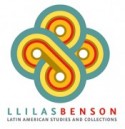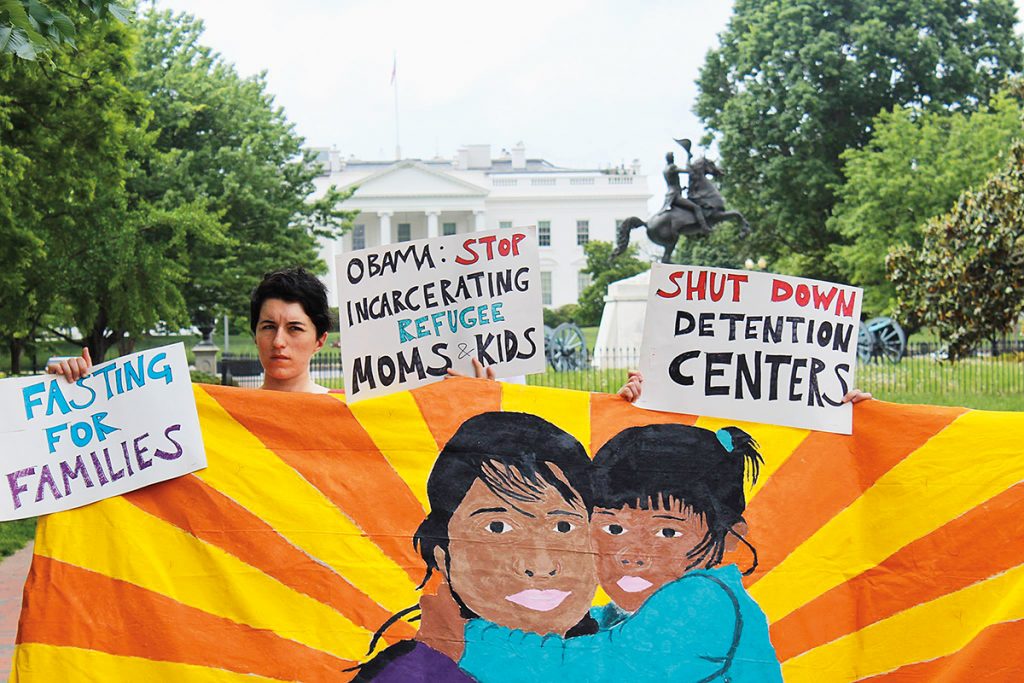
BY RUTH ELIZABETH VELÁSQUEZ ESTRADA
We became conscious of the right to have rights and of the right to belong to an organized community only when millions of people had lost their rights, and could no longer recuperate them. —Agustín Estrada Negrete, political asylee and immigrant rights activist
For seven years, the annual Lozano Long Conference of the Teresa Lozano Long Institute of Latin American Studies (LLILAS) has sought to create long-standing relations of collaboration and dialogue, intertwined with calls to action, across universities and communities throughout the Americas. UT Austin faculty members Rebecca Torres (Geography) and Alfonso Gonzales (LLILAS, Mexican American and Latino/a Studies) did an outstanding job advancing that commitment this year. The timely conference “Derechos en Crisis: Refugees, Migrant Detention, and Authoritarian Neoliberalism” brought together a stellar multinational group of faculty, lawyers, graduate students, community organizers, and activists who are working on an increasingly important topic: Mexican and Central American refugees.
In 2014, the Obama administration saw the highest rate in a decade of child asylum seekers, children without parents or legal guardians, restrained in detention centers, a phenomenon that later came to be known as the crisis of unaccompanied minors. Unaccompanied minors left their homes in Mexico, Guatemala, El Salvador, and Honduras to escape gender violence, organized crime, and gang violence. This context forced me, a PhD candidate in anthropology and a presenter on the panel Violence, Forced Migrations, and Central American Refugees, to ask the following questions: How did people’s right to seek asylum result in the state’s practice of imprisoning asylum seekers in the United States? What can we do to transform the underlying logics of this immigrant-refugee system?
The Crisis of Rights: A Brief Background
In planning and conceiving the conference, Gonzales argued that rather than a refugee crisis, what we have is a crisis of rights under neoliberalism, a term referring to the strengthening of the repressive branch of the state amid reduction of the social arm. The right of asylum emerged with the United Nations 1951 Refugee Convention, and is grounded in Article 14 of the 1948 Universal Declaration of Human Rights. The convention in its Article 1 states in part that a refugee is a person who, “owing to a well-founded fear of being persecuted for reasons of race, religion, nationality, membership of a particular social group or political opinion, is outside of the country of his nationality, and is unable to, or owing to such fear, . . . unwilling to avail himself of the protection of that country.”[1] The convention also acknowledges that seekers of asylum might breach immigration rules to make themselves safe. Thus, it is prohibited to penalize people “with immigration or criminal offences in relation to the seeking of asylum, or [to keep them] arbitrarily detained purely on the basis of seeking asylum.”[2] In the aftermath of War World II, the right to seek asylum was limited to people fleeing events occurring before 1951 in Europe. In 1967, a UN protocol removed this limitation, making the right universal.[3]
In the aftermath of the Cold War, reasons for asylum seekers’ fears of persecution came to include gender and threats from organized crime and youth gangs. Today’s asylum requests by Mexican and Central American people thus go beyond the 1951 refugee category. These refugees’ asylum requests appear to have fallen into a “bureaucratic gray zone”—they do not clearly fit the established refugee categories. In the United States, a country with a historically racialized anti-immigration policy, one outcome of this “gray zone” has been the detention of asylum seekers, including charges of immigration offenses. Thus, for Gonzales, the thousands of asylum-seeking detainees at the U.S.–Mexico border are “the outcome of a migration-detention regime that has been reconfigured precisely to prevent people from entering the United States through the process of asylum.”[4]
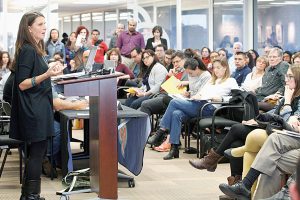
Conference presenter Dawn Paley, renowned author of the book Drug War Capitalism and a graduate student at the University of Veracruz in Mexico, spoke of the current crisis of rights in connection with historical socio-political processes in Central America. She pointed to extreme inequality, elites’ refusal to pay taxes, and high levels of state corruption as the root causes of the current crisis of rights in the region. Paley also pointed to the $9 billion of military aid given by the U.S. government to repressive regimes in Central America in 1980s, and U.S. support of the United Fruit Company, which owned large amounts of land in the region but refused to pay taxes. For Paley, these processes created the political and economic exclusion leading to the Central American civil wars of the 1980s, which resulted in thousands of people disappeared, killed, or seeking asylum. In the post–Cold War era, Paley argues that U.S. deportation of gang members, the War on Drugs, and austerity policies embedded in the Central American Peace Accords created a context of violence in the region.
Similarly to Paley, Alex Sánchez of the organization Homies Unidos, who presented in the keynote panel, pointed to the implementation of contemporary policies, like the U.S. deportation of gang members and the Alliance for Prosperity Plan, as underlying causes escalating the number of asylum seekers. He explained that to reduce the gang problem in Los Angeles, the U.S. government deported gang members to Central America in the 1990s. In El Salvador, youth gang members found themselves without jobs and with scarce opportunities to work because of their criminal label. Many of these gang member deportees organized the already constituted Salvadoran youth gangs. The renewed youth gangs, and other common criminals posing as gang members, began extorting people in order to make a living. More recently, Sánchez points out, the development and security components of the Alliance for Prosperity policy have resulted in gentrification of impoverished communities, as well as further state repression and criminalization of youth gang members, who are already marginalized and criminalized within the youth sectors and poor barrios of the U.S. and Central America. For Sánchez, youth gangs seem to have no other option than to remain in the Central American countries, while countless people from this region flee their countries as a result, because an effective and just vision of violence reduction has yet to emerge.
Related to Paley’s and Sánchez’s assertions, my doctoral research on grassroots peacemaking led by youth gangs in El Salvador has revealed that the 1992 Salvadoran Peace Accords, which ended twelve years of civil war, have sustained socioeconomic inequities. Former right-wing president Alfredo Cristiani inscribed in the accords that for the reunification of Salvadoran society “the policy of privatization shall increase society’s share of ownership by affording workers access to ownership of privatized companies.”[5] In the 1990s, under the auspices of the accords, a wave of privatization took place that increased the ranks of the economically disenfranchised in the name of peace.
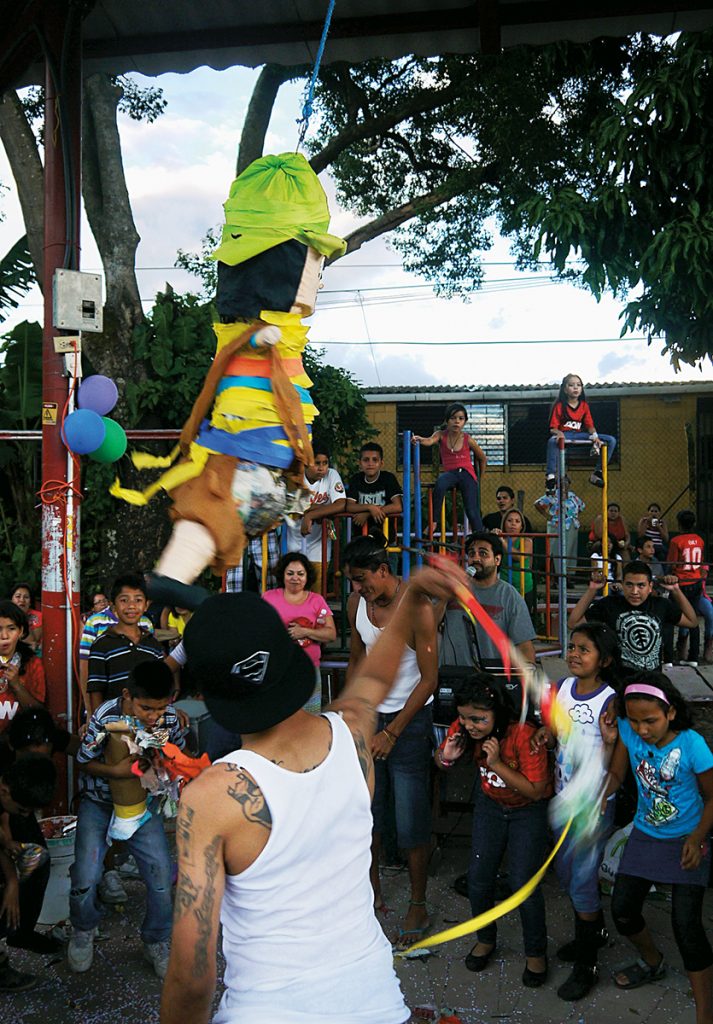
In contrast to Paley and Sánchez, my research found that in order to survive the state’s repressive measures, youth gangs have engaged in grassroots peacemaking efforts. These efforts are a survival tactic that reflects a critique of the state’s approaches to peace. Since the 1992 Peace Accords, El Salvador has become the most violent country in the world, with 102 homicides per 100,000 people in 2015.[6] Despite other forms of violence, such as gender, common crime, and organized crime, the Salvadoran state holds youth gangs responsible for this homicidal violence and to date has implemented mostly punitive measures (e.g., Iron Fist, the militarization of public security) to end it, without success. In March 2012, with the support of the leftist Mauricio Funes administration, the leadership of opposing youth gangs agreed to a national truce, stating: “For the good of the country, our families, and ourselves, we ask you [state officials] to allow us to contribute to the pacification of El Salvador, which is not just yours, but ours as well.” During the two years the truce endured (from 2012 to 2014), the national homicide rate dropped from 13.5 to 8.5 per day. Yet the truce was short-lived. Leading up to the presidential elections of February 2014, the right-wing political parties accused the Funes administration of negotiating with criminals. After much political critique, former president Funes retracted his support for the gang truce.
Youth gangs’ peacemaking efforts revealed yet another aspect of the crisis of rights: the discourse of youth gangs as criminals has come to be more politically expedient than grappling with the multiple constituted causes of violence producing the Central American refugees of today.
Criminalization of Asylum Seekers
Immigrant rights activist Agustín Estrada Negrete, a political asylee and self-identified transgender person, argues that immigrant asylum seekers are treated as criminals because in practice the right to asylum is no longer a universal right. “It is very sad when you are fleeing torture in your home country to come to another country to ask for help, and they treat you as a criminal,” he exclaimed. As a conference panelist, Estrada Negrete asserted that the goal of the neoliberal immigration-refugee system is to modify the very understanding of universal human and refugee rights, so that the lack of access to those rights by the poor and marginalized becomes a well-accepted norm within civil society. In this sense, he emphasizes that we are not seeing a crisis of rights, but instead we are witnessing how the logic of neoliberalism operates in relation to refugees—normalizing the securitization of the right of asylum and the criminalization of Mexicans and Central Americans refuge seekers. He concluded by asserting, “We became conscious of the right to have rights and of the right to belong to an organized community, only when millions of people had lost their rights and could no longer recuperate them.”
In contrast to Estrada Negrete, José Luis Hernández Cruz, president of the Asociación de Migrantes Retornados con Discapacidades (Association of Returned Migrants with Disabilities), spoke in an emotionless voice about his own frustrating experience seeking asylum. In 2004, at age 18, like many Honduran youth, he had fled his country seeking to escape poverty and gang violence. To evade Mexican authorities, he traveled on the roof of a cargo train, popularly known as la bestia (the beast), from Tapachula, Mexico, to the United States. Exhausted after twenty days of travel, he fell onto the railroad tracks while asleep. The train cut off one of his legs and one of his arms. Since then, Hernández Cruz has dedicated his life to demanding that Mexican authorities provide Central American migrants with a permit to freely travel to the U.S. border. Over 400,000 migrant asylum seekers cross Mexico annually on their way to the United States.[7]
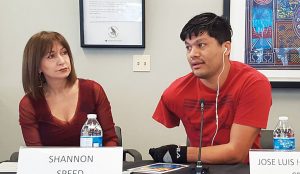
The testimonies of Estrada Negrete, Hernández Cruz, and others expanded participants’ legal and geopolitical understanding of the rights regime that was ostensibly designed to protect refugees. The testimonies also revealed that the right to seek asylum does not start at the U.S.–Mexico border but in the countries through which asylum seekers travel to reach their destination. This dialogue invites us to think creatively about a socially just asylum and human rights system.
The Role of Academics in the Current Crisis
The earnest sharing of knowledge at the Lozano Long Conference inevitably raised a critical question as to the role of academics at universities where we teach, and in society at large, in the crisis-of-rights era. As LLILAS Benson director Charles Hale pointed out, “these dialogues of knowledge invite us to imagine a university that is consistent with the kind of societies we would like to build.” Sociologist Cecilia Menjívar, faculty at the University of Kansas, emphasized, “our scholarly work should enable us to change the conditions in which the populations we study live—in this case, through legal strategies that can help the women and children in detention centers.” Building on the work of Michael Burawoy, Menjívar called upon academics to consider becoming public intellectuals by writing op-eds or working closely with a visible organization, such as a faith-based community, labor movement, or one that advocates for immigrant rights. She encouraged academics to produce historically specific knowledge of the contexts that generate the fear of persecution forcing people out of their countries, for example gender-based violence and state-complicit participation (i.e., lack of action). This kind of rigorous work enables academics to serve as expert witnesses in asylum cases, as Menjívar does. Menjívar also encouraged academics to raise awareness in their universities by helping students to understand how structural and historical forces have shaped their own lives and place in the world.
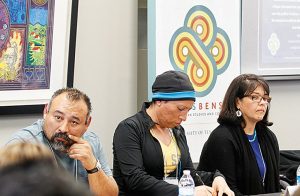
Final Notes on Cross-Pollination of Knowledges and Actions
Professors Rebecca Torres and Alfonso Gonzales brought together an impressive group of organizers, activists, scholars, graduate students, and attorneys to debate an important topic. Gonzales’s analysis of the so-called “refugee crisis” brought to light the fact that state practices around refugees have created an immigration-asylum regime that actively prevents people from winning their asylum claims, specifically Mexicans and Central Americans. Activist Agustín Estrada Negrete revealed a key contradiction of the universal human rights era, which is the normalization of the idea that human rights are only for certain groups of people. Those who are excluded, in this case asylum seekers, are criminalized. Author Dawn Paley provided broad strokes about the underlying histories of U.S. involvement in the region and elites’ roles in the root causes of today’s crisis of rights. Velásquez Estrada revealed difficult-to-conceive grassroots peacemaking efforts led by youth gangs in El Salvador. Interventions by people like Estrada Negrete, Paley, and Velásquez Estrada steered us away from easily agreed-upon conclusions. In this regard, Esther Portillo Gonzales, a co-founder of the Human Rights Alliance for Child Refugees and Families, which supports Central American and Mexican refugees, remarked that the conference was “the first time Central American and Mexican refugees directly affected by U.S. foreign policies and immigration policy and scholars came together to discuss more deeply what could be done around the crisis created by backwards U.S. policies that have directly impacted them.” These discussions encourage scholars and activists to collaborate across borders.
Torres and Gonzales plan to produce a follow-up document on the conference for publication. In it, the two scholars aim to grapple with underlying economic, social, and political root causes producing asylum seekers from Mexico and Central America. In addition, two conferences following up on the themes covered at the 2016 Lozano Long Conference are being organized by professors Ursula Roldán of Rafael Landívar University in Guatemala and Julieta Castellanos from the National Autonomous University in Honduras. LLILAS students and faculty will likely participate. The scholarly and grassroots dialogues and collaborations that emerged from the Derechos en Crisis conference are an indication of the paradoxes of the era of human and asylum rights—a crisis that is not a crisis, people seeking rights that are vanishing before our very eyes, violent people who are also peacemakers. These conversations allowed the envisioning of a hopeful, collaborative path to transform society—the production of knowledge that helps us to better understand pressing social issues, and grassroots actions aimed at defending the universal character of human rights. Participants in the conference felt a sense of optimism as a result of having been part of a cutting-edge conference on the frontier of activism and scholarship at The University of Texas at Austin.
Ruth Elizabeth Velásquez Estrada is a doctoral candidate in the Department of Anthropology at The University of Texas at Austin. She completed her master’s degree at UT Austin’s Activist Anthropology Program in 2011. Velásquez is the author of Grassroots Peacemaking: The Paradox of Reconciliation in El Salvador (Social Justice, 2015). Her dissertation examines the paradoxes of grassroots peacemaking in El Salvador.
Notes
[1] United Nations Refugee Convention and Protocol (December 2010), 14. Retrieved from www.unhcr.org/3b66c2aa10.html.
[2] Ibid., 3.
[3] Ibid., 2.
[4] Alfonso Gonzales, “Derechos en Crisis: Mexican and Central American Asylum in the Age of Authoritarian Neoliberalism” (2016), unpublished manuscript.
[5] United Nations, 1992, El Salvador Agreements: The Path to Peace (New York: UNO), 77, 82.
[6] “El Salvador, el país más violento en el continente,” 2015, El diario de hoy, December 30.
[7] Miranda León, “Pasan por México cada año 400 mil migrantes,” El universal, June 8, 2012.


